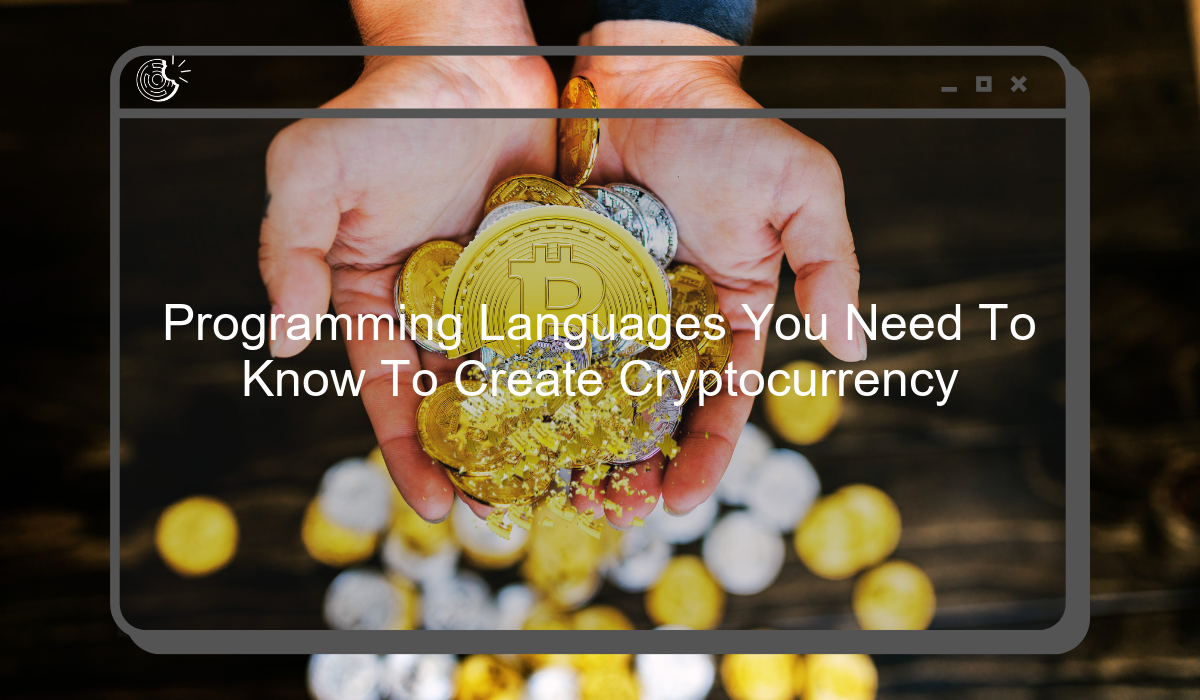Programming Languages You Need To Know To Create Cryptocurrency

Blockchain and cryptocurrency technology is incredibly fascinating, and as it grows in popularity, it is becoming clear that it will continue to infiltrate many aspects of our society.
If you are someone involved in tech, programming, software development or more, adding knowledge on how to create cryptocurrency to your CV will only be a benefit.
It will enable you to compete in a world where blockchain is king and where being able to develop cryptocurrencies as well as applications on the platform will give you a definite edge.
There are an almost infinite amount of programming languages, all with different features and benefits that lend themselves to specific tasks, but, knowing which ones apply well to cryptocurrency and blockchain creation is a little more tricky.
What programming languages, do you need to know to create cryptocurrency?
In this guide, we will discuss:
- What Challenges Do Cryptocurrency Programmers Face?
- An Introduction To Programming For Cryptocurrencies
- Working In Cryptocurrency
- Tips For Creating Your Cryptocurrency
What Challenges Do Cryptocurrency Programmers Face?
Creating and developing a public blockchain that functions correctly, is not an easy feat for many reasons.
Firstly, a blockchain should be a completely secure digital fortress, yet one which makes its code public for everyone to access.
This means that it must be available for anyone to look over and asses for bugs or vulnerabilities, however in the case of blockchains, if someone is t stumble across a weakness, that could result in the loss of millions and millions of dollars as that individual would know how to hack it.
If you are creating a cryptocurrency and, a blockchain, you should also be prepared to have the resources on hand to handle queries and to keep up with the ongoing demands of the network.
You must also consider the performance of the currency and platform as it must always be performing at its highest capability, but for this to be the case, one must ensure that the language chosen to create it is versatile enough for the job.
Tasks such as digital signature verification and transaction executions need to be well thought out and programmed in a way that does not impact the speed or efficiency of the platform.
Also, during the development of the blockchain, all of the transaction operations must be deterministic. It is not possible to have a transaction that at one moment, behaves in one, way and then acts in an entirely different way the next day.
Likewise, you cannot have a smart contract that functions in two different ways on two different machines. The only solution to this issue is isolation where you isolate your transactions and smart contracts from any non-deterministic elements.
These are just some of the leading problems that developers face. Now let us look at the most popular languages used to combat them.
An Introduction To Programming For Cryptocurrencies
Which programming language you choose to create a cryptocurrency will depend solely on the features and functions that you want your coin to have.
Ideally, you want to go for a programming language that is supported widely and also has a large and active community that you can tap into for development support should the need arise.
Ideally, before looking to learn other programming languages to support cryptocurrency development, it would be a good idea to have a strong foundation in C++, and then you will be able to use another popular language such as Java, Python or Perl to create your coin.
Whichever route you take, just be sure to use a language that is compatible with cryptocurrency environments and can be scaled, adapted and added to when required.
C++
https://youtube.com/watch?v=Rub-JsjMhWY%3Ffeature%3Doembed
This programming language is a general-purpose programming language, and it is one of the most widely used and recognised languages.
It has features which are imperative, object-orientated and it offers generic programming features as well as providing low-level memory manipulation.
It has been found to suit a wide range of contexts, notably desktop applications, servicer, web search, and e-commerce and it is has been influential to the development other, other languages such as D, Java and newer versions of C.
Bitcoin is entirely written in C++ and enjoys an active and informative development community as well as a test console application which gives you the ability to build a fully functioning blockchain application in a matter of minutes.
There is also a wide range of FAQs and information sites online that can help you build and develop a cryptocurrency using this language.
Created by Bjarne Stroustrup as an add-on and extension of the C language it was conceptualised with the idea of increasing the flexibility and efficiency of C and by making it more object orientated.
With C++, all of the functions and data are combined into a neat package meaning that when an object is created, it is easy to reuse it in another programme which has a drastic effect on the time is taken to code.
While there are lots of new-fangled and feature filled languages out there, people stick to C++ because it offers superior memory control, it has a good threading ability that will handle both parallel and non-parallel tasks and also provides move semantics which provides a way in which contents can be moved rather than just copied.
Javascript
https://youtube.com/watch?v=Ukg_U3CnJWI%3Ffeature%3Doembed
Javascript is one of the three leading technologies that was used to create the Internet, along with HTML and CSS and it is often used to create interactive web pages.
It can also be used to create cryptocurrencies and to set up blockchains as well as the applications that run on it.
Often shortened to JS, it a high-level, interpreted programming language which is considered to be dynamic, prototype-based and multi-paradigm.
All modern web browsers support it, and it supports event-driven, functional, and imperative programming styles.
Python
https://youtube.com/watch?v=fpqzXgZjSqM%3Ffeature%3Doembed
Python is a high-level programming language that is used for general purpose programming.
Guido Van Rossum created it in 1991, and its philosophy emphasises code readability and a syntax that gives programmers the ability to express concepts in fewer lines of code.
It allows programmers to present constructs that enable explicit programming on a big and a large scale.
It is an incredibly minimal and straightforward programming language and uses a lot of white spaces to signify the presence of a code block instead of using keywords and curly brackets like other languages.
Solidity
https://youtube.com/watch?v=v_hU0jPtLto%3Ffeature%3Doembed
Last but not least, we can consider Solidity. If you are someone that is interested in making Decentralised Applications (DAPPs) or you are considering getting into ICOs then learning this programming language is essential.
It was developed by several former core members of the Ethereum team, and it allows users to write smart contracts on various blockchains.
Solidity is a very sick and loosely typed language with a syntax with many similarities to Javascript and it is perfect for creating smart contracts on the Ethereum blockchain, as well as having many features that make it ideal for developing new currencies.
These are just four of the languages that lend themselves to creating and developing blockchains and new currencies, but there are in fact many more that lend themselves to this purpose such as Java and Go.
For computer programmers, there are an endless list of possibilities and getting to grips with the best languages for the job will be a significant advantage to you.
Working In Cryptocurrency
While the cryptocurrency industry is going from strength to strength, finding qualified developers that have the skill set and knowledge to create and develop new currencies is becoming increasingly harder.
Despite its popularity, there are just not enough developers for the jobs that need filling.
Pretty much every company that works within the sphere of cryptocurrency is unable to recruit the number of staff it needs. These are companies with considerable revenues and growth potential, but they are unable to find enough qualified developers.
So what is holding back developers from learning more about creating cryptocurrencies?
Some believe that the high level of attention to detail and rigour needed to create and programme blockchain applications is putting people off.
While a mistake with programming a website may result in a few minutes of downtime, if they mess up the execution of a Bitcoin transaction, it could lead to a loss of a substantial amount of money.
In other words, the level of thoroughness that is required is just not there, and many developers seem to be unwilling to step up their programming game and jump into this exciting area of technology.
Tips For Creating Your Cryptocurrency
https://youtube.com/watch?v=JHrQ3l2tT78%3Ffeature%3Doembed
If you have got this far and have decided that you have got what it takes to create your cryptocurrency, then here are a couple of tips and bits of advice for you to consider before you get going.
#1 Writing the code is one of the first steps that you need to think carefully about. Do your research and make sure the language that you pick is the one that is most suited to the particular features and functions that you want your coin to have.
#2 Consider whether you want to create a currency fork or a new currency from scratch- consider your options carefully and pick the option that suits your requirements.
#3 Remember that you should create a prototype first before you even think launching it. This way you can be sure that the code is secure and that any issues are ironed out before it starts meaning that there is less risk of losing any money.
#4 Have a goal in mind and be sure that you know how you want it to be used as well as how far you would like it to go.
#5 Make sure the benefit of using the coin is clear, other than just for purchasing purposes.
#6 Be sure that you are aware and conscious of any actual or potential vulnerabilities. Think like a hacker and be sure that your code is entirely impenetrable.
#7 Seek help with other members of the developer community and be sure to get useful tips and advice to ensure you are properly troubleshooting issues and making improvements to your currency.
#8 Find miners and investors As soon as the product is created and tested, you need to share your ideas and vision with the world- build trust, share your intention and long-term goals and remain honest at all times.
Conclusion
As technology continues its unstoppable march, the old way of doing things will soon become obsolete. While there has been a little resistance to cryptocurrencies, mainly from governments and CEOs of leading banks, they are the way of the future.
While the concept of digital currencies is still entirely new, the economy is slowly shifting towards an ecosystem that is completely digital and online and does away with paper and traditional forms of money altogether.
Learning how to code and develop your cryptocurrencies or blockchains will be an essential part of the future, and with a considerable deficit of talented and qualified crypto-savvy programmers and developers, there are precious pickings job-wise for the ambitious amongst us.
Which programming language you use is up to you- as a developer, you should know all of them anyway, but understanding how their benefits can be utilised for this new type of technology is an integral part of making sure that the industry reaches its potential promptly.
Read more on How To Create Your Cryptocurrency.
Crypto Expert
